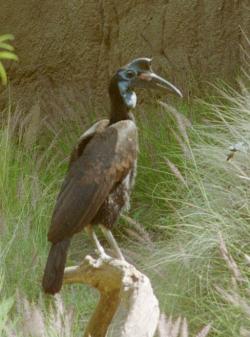Bucorvus
|
|
| Bucorvus | ||||||||||||
|---|---|---|---|---|---|---|---|---|---|---|---|---|
 Abyssinian Ground Hornbill (Bucorvus abyssinicus) | ||||||||||||
| Scientific classification | ||||||||||||
| ||||||||||||
| Species | ||||||||||||
|
Bucorvus leadbeateri |
Bucorvus is a genus of the Bucerotidae family (hornbills). Species included in the genus are:
Southern Ground Hornbill, Bucorvus leadbeateri, is a large-sized bird, with length between 90 to 129 cm. It is characterized by black coloration and vivid red-coloured face and throat patches (yellow in juvenile birds). The white tips of the wings (primary feathers) seen in flight are another diagnose characteristic. The beak is black, straight and presents a casque, more developed in males. Female Southern Ground Hornbills are smaller and present a blue stripe in the throat patches.
Its habitat comprises savannahs, woodlands and grasslands of north-east southern Africa. The Southern Ground Hornbill is a vulnerable species, mainly confined to national reserves and national parks. They live in groups of 5 to 10 individuals including adults and juveniles. Often, neighbouring groups are engaged in aerial pursuits. They forage on ground, where they feed on reptiles, frogs, snails, insects and small mammals. Juveniles are dependent of adults for 6 to 12 months.
The other species of the genus is:
- Abyssinian Ground Hornbill, Bucorvus abyssinicus, represented below
References
- Gordon Lindsay Maclean - Robert's Birds of South Africa, 6th Edition
